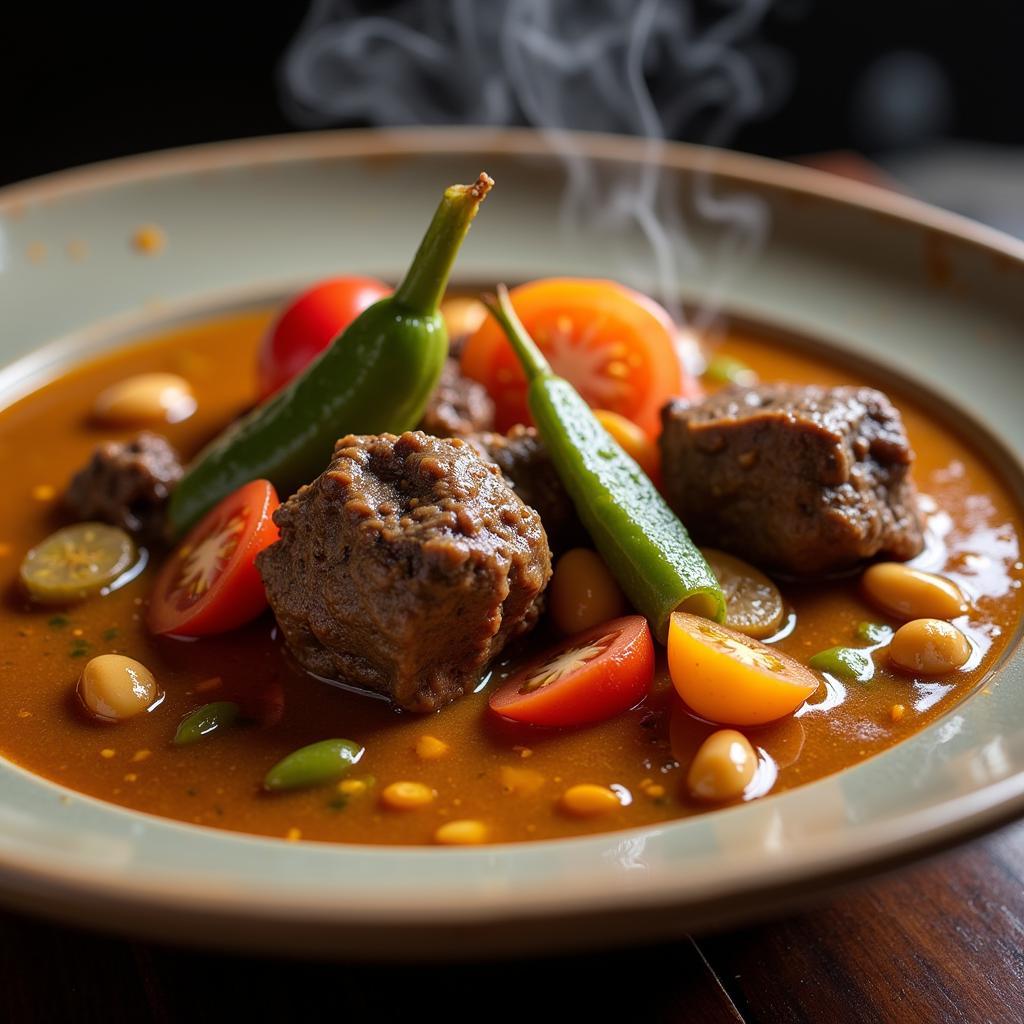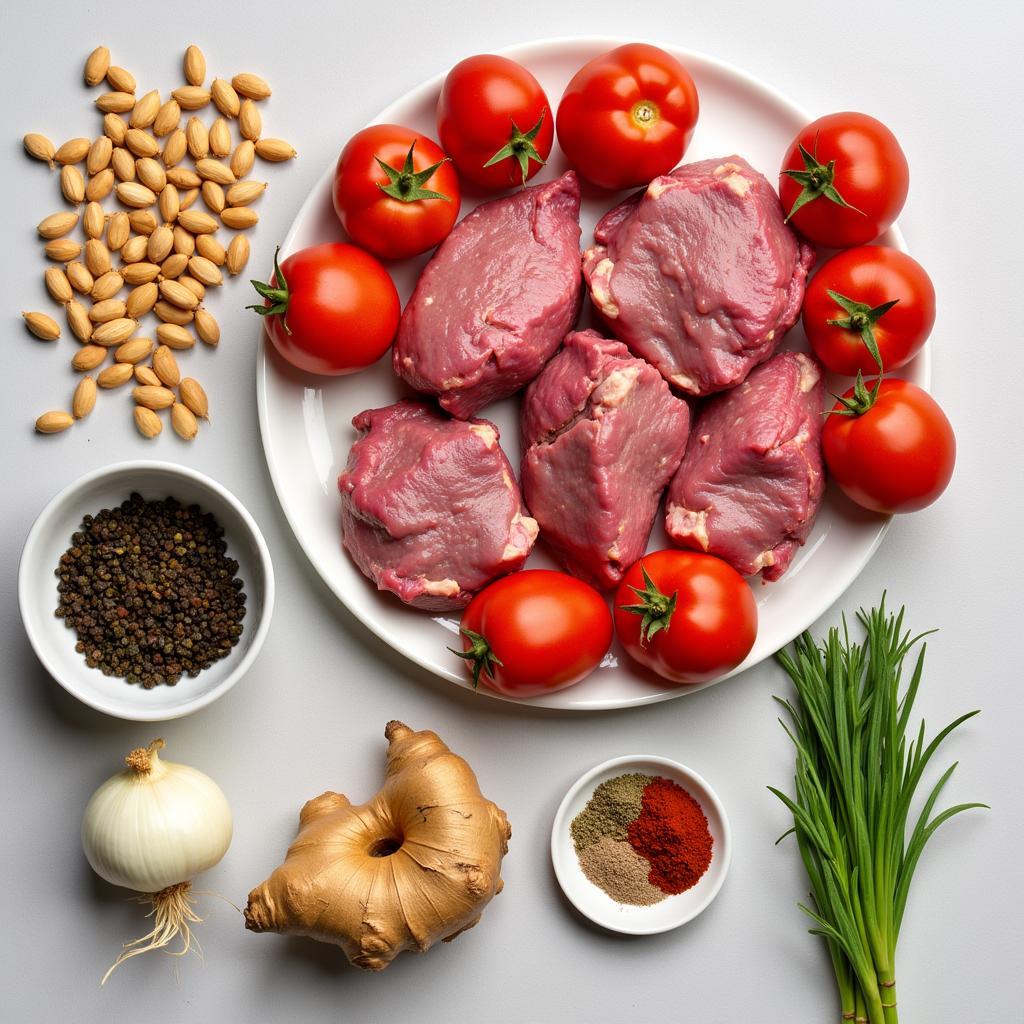African Lamb Peanut Stew: A Delicious Culinary Journey
African Lamb Peanut Stew, a rich and flavorful dish, invites you on a culinary adventure across the diverse landscapes of Africa. This hearty stew combines tender lamb with the creamy richness of peanuts, creating a symphony of flavors that embodies the warmth and hospitality of African cuisine. From West Africa’s Maafe to variations across the continent, peanut stew showcases the ingenuity and culinary traditions of its people.
Discovering the Magic of African Lamb Peanut Stew
African lamb peanut stew isn’t just a meal; it’s a celebration of flavors and textures. The tender lamb, slow-cooked to perfection, absorbs the nutty goodness of the peanut sauce, creating a truly satisfying experience. The stew often incorporates a variety of vegetables, adding layers of complexity and nutritional value. It’s a dish that warms the soul and nourishes the body. You can discover similar delicious recipes through our African food recipes.
What makes this stew so unique is its adaptability. While the core ingredients remain consistent—lamb, peanuts, and vegetables—the specific spices and additions vary depending on the region and even the family. This allows for endless variations, each reflecting the unique culinary heritage of its creator.
Regional Variations: A Tapestry of Flavors
Across the African continent, different regions have their own distinct take on peanut stew. In West Africa, Maafe, a popular version of the stew, often features tomatoes, onions, and spices like ginger and garlic. Further south, variations might include sweet potatoes, okra, or collard greens. These regional differences highlight the diverse agricultural landscapes and culinary traditions across Africa. If you’re looking to try authentic African cuisine nearby, explore our African dishes near me.
West African Maafe: A Classic Peanut Stew
Maafe is a quintessential West African peanut stew, a testament to the region’s love for bold flavors. The stew typically features tender chunks of lamb simmered in a rich peanut sauce, seasoned with aromatic spices like ginger, garlic, and chilies. Tomatoes and onions add a touch of sweetness and depth, while vegetables like okra or sweet potatoes contribute a hearty texture.
 West African Maafe Peanut Stew
West African Maafe Peanut Stew
East African Peanut Stew: A Fusion of Flavors
East African peanut stews often incorporate coconut milk, lending a creamy sweetness to the dish. Spices like cumin and coriander add warmth and complexity, while the addition of leafy greens like spinach or kale provides a nutritional boost. This fusion of flavors reflects the region’s coastal influence and diverse culinary heritage.
Why is African Lamb Peanut Stew so Popular?
Its rich, savory flavor profile combined with its nutritional value makes this stew a beloved dish across the continent. It’s a hearty, satisfying meal that can be easily adapted to suit different tastes and dietary preferences. Looking for a career in the culinary field? Check out African country foods for vacancies.
How is African Lamb Peanut Stew Made?
The process begins by browning the lamb, then creating a flavorful base with onions, garlic, and spices. Peanuts are added, either as peanut butter or ground peanuts, to create the signature creamy sauce. Finally, vegetables are added and the stew is simmered until the lamb is tender and the flavors have melded together.
“African peanut stew is more than just a dish; it’s a story told through flavors,” says Abena Osei, a renowned Ghanaian chef. “Each ingredient contributes to a narrative that reflects the history and culture of the region.”
What are the Health Benefits of African Lamb Peanut Stew?
Lamb provides protein and essential nutrients, while peanuts are a good source of healthy fats and fiber. The vegetables add vitamins and minerals, making this stew a nutritious and balanced meal. Another healthy and flavorful option is African goat soup. For more information on African Cuisine, check out African foody.
 African Lamb Peanut Stew Ingredients
African Lamb Peanut Stew Ingredients
“The beauty of African peanut stew lies in its versatility,” adds Chef Kofi Atta, a culinary expert specializing in West African cuisine. “It’s a dish that can be enjoyed by everyone, regardless of their dietary preferences.”
Conclusion
African lamb peanut stew is a culinary masterpiece, showcasing the rich and diverse flavors of Africa. Its adaptable nature and nutritional value make it a beloved dish across the continent and beyond. So, embark on this culinary adventure and discover the magic of African lamb peanut stew.
FAQ
-
What type of lamb is best for peanut stew? Lamb shoulder or leg are ideal for stews as they become tender during slow cooking.
-
Can I use chicken or beef instead of lamb? Absolutely! Chicken and beef are excellent alternatives to lamb in peanut stew.
-
What kind of peanuts should I use? Roasted, unsalted peanuts are recommended for the best flavor.
-
How can I adjust the spiciness of the stew? Adjust the amount of chili peppers or hot sauce to your liking.
-
Can I make this stew vegetarian? Yes, substitute the lamb with firm tofu or vegetables like sweet potatoes and butternut squash.
-
How long can I store leftover stew? Store leftover stew in an airtight container in the refrigerator for up to 3 days.
-
Can I freeze peanut stew? Yes, you can freeze peanut stew for up to 3 months.
Common Scenarios & Questions
- Scenario: You are hosting a dinner party and want to impress your guests with a unique and flavorful dish.
- Question: Is African lamb peanut stew suitable for a dinner party?
Absolutely! African lamb peanut stew is a great option for a dinner party. It’s a flavorful and unique dish that’s sure to impress your guests.
- Scenario: You are looking for a healthy and nutritious meal that is also easy to prepare.
- Question: Is African lamb peanut stew a healthy meal option?
Yes, African lamb peanut stew is packed with protein, healthy fats, and vitamins and minerals from the vegetables.
More Questions and Related Articles
- For more African recipes, visit our blog section on African cuisine.
- If you are interested in learning more about African culture, check out our articles on African art, music, and history.
Need help?
Contact us 24/7 for assistance. Call us at +255768904061, email us at kaka.mag@gmail.com, or visit us at Mbarali DC Mawindi, Kangaga, Tanzania.



